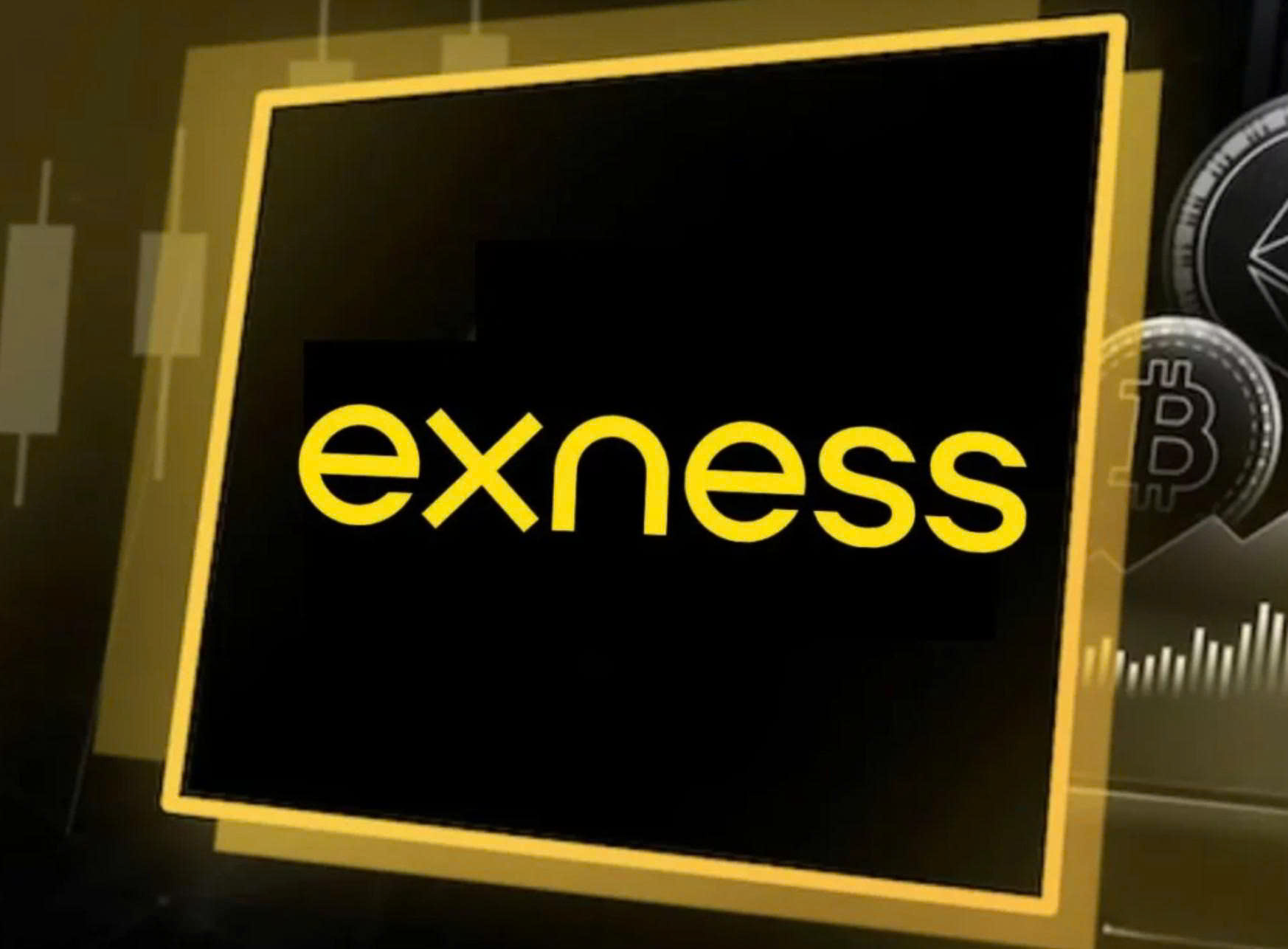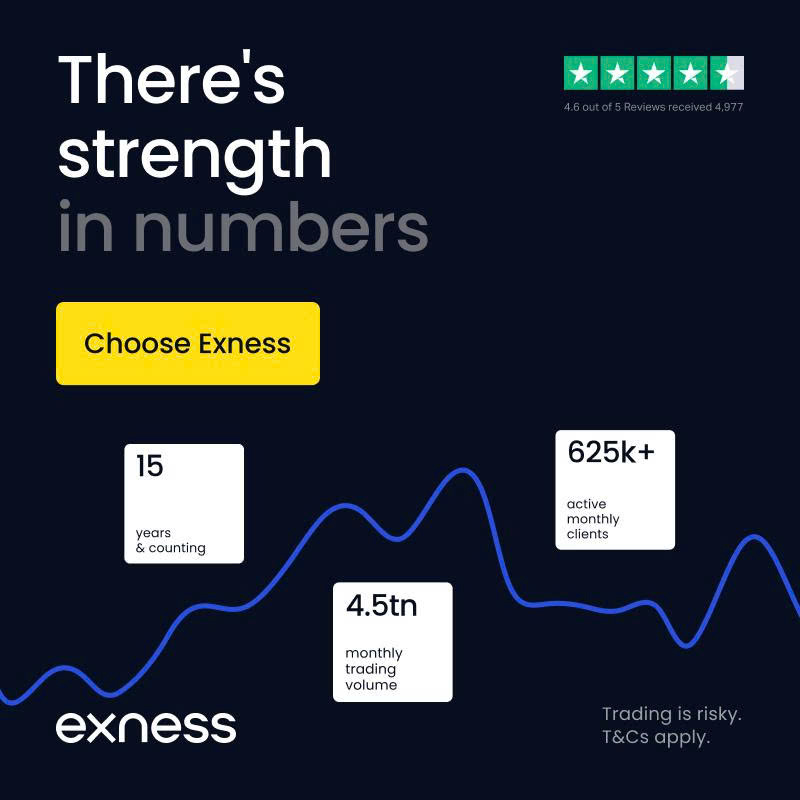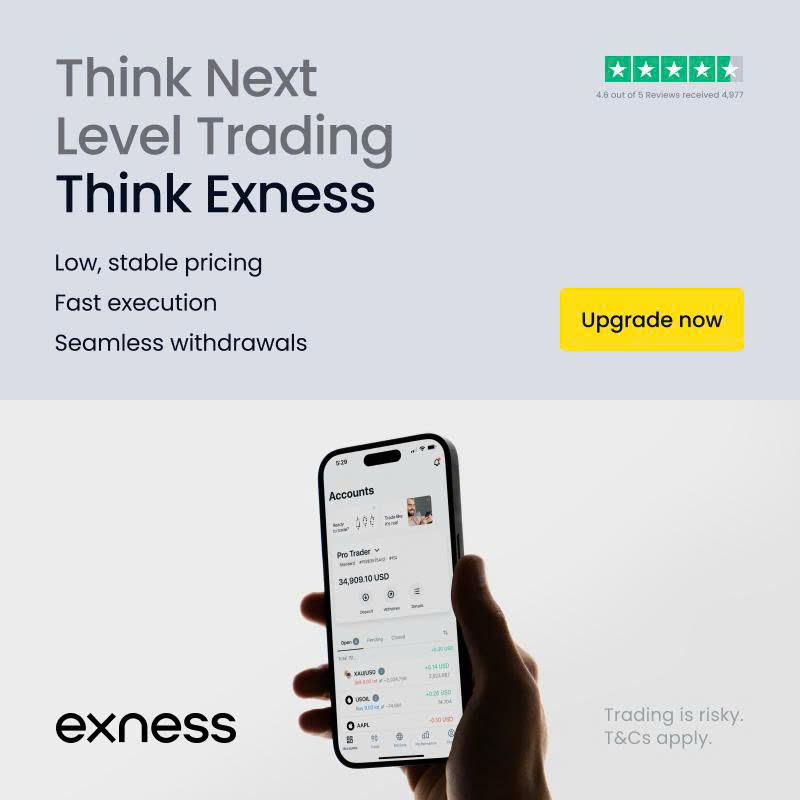
8 minute read
Exness vs Fusion Markets Comparison
from Exness vs Fusion
If you’re a forex trader looking for the best broker in 2025, you’ve likely come across Exness vs Fusion Markets. Both are reputable names in the forex and CFD trading world, but which one is better for you? In this Exness vs Fusion Markets comparison, we’ll dive straight into the key differences—fees, platforms, regulation, and more—to help you decide which broker aligns with your trading goals. Whether you’re a beginner or a seasoned trader, this guide will break it down in a clear. Let’s get started!

✅ Trade with Exness now: Open An Account or Visit Brokers 👈
Quick Overview: Exness vs Fusion Markets
Before we dive into the nitty-gritty, here’s the short version: Exness is a global giant, founded in 2008, known for high leverage, tight spreads, and a wide range of trading instruments. Fusion Markets, established in 2017 in Australia, focuses on ultra-low-cost trading with a transparent, no-frills approach. Both are regulated and reliable, but they cater to slightly different audiences. Exness is ideal for traders seeking flexibility and advanced tools, while Fusion Markets is perfect for cost-conscious traders who value simplicity.
Now, let’s unpack the details across 11 key criteria to see how they stack up.
1. Regulation and Trustworthiness
Trust is everything when you’re depositing your money with a broker. So, how do Exness vs Fusion Markets compare in terms of regulation?
Exness: Founded in 2008 and headquartered in Cyprus, Exness is regulated by multiple top-tier authorities, including the FCA (UK), CySEC (Cyprus), FSCA (South Africa), and FSA (Seychelles), among others. With a monthly trading volume exceeding $3 trillion, Exness is a heavyweight in the industry. It segregates client funds and offers negative balance protection, ensuring your money is safe. However, some retail clients may be onboarded under less strict jurisdictions like Seychelles, depending on your location.
Fusion Markets: Established in 2017 in Australia, Fusion Markets is regulated by ASIC (Australia), one of the most respected regulators globally, and VFSC (Vanuatu) for international clients. While ASIC’s oversight is a big plus, the VFSC is considered less rigorous. Fusion Markets also segregates client funds and keeps them with top-tier banks like HSBC and NAB, but its regulatory portfolio isn’t as extensive as Exness’.
Verdict: Exness takes the lead here due to its broader regulatory coverage across multiple jurisdictions. If regulation is your top priority, Exness offers more peace of mind, especially for international traders.
2. Trading Fees and Spreads
Your trading costs can eat into your profits, so let’s talk fees and spreads.
Exness: Offers variable spreads, with standard accounts starting at 0.3 pips for major pairs like EUR/USD. Its Raw Spread and Zero accounts can go as low as 0.0 pips but come with a commission of $3.5 per lot per side. Standard accounts are commission-free, making them great for beginners.
Fusion Markets: Known for its low-cost model, Fusion Markets offers fixed spreads starting at 0.0 pips on its Zero account, with a commission of $4.5 AUD per lot (about $3 USD). The Classic account is commission-free with spreads starting at 0.8–0.9 pips. Fusion Markets often edges out competitors on overall trading costs.
Verdict: Fusion Markets wins for cost-conscious traders, especially those using the Zero account, as its spreads and commissions are slightly lower than Exness’. However, Exness’ commission-free Standard account is a better fit for beginners who want to avoid extra fees.
3. Trading Platforms
The platform you trade on can make or break your experience. Let’s see what each broker offers.
Exness: Supports MetaTrader 4 (MT4), MetaTrader 5 (MT5), Exness Terminal, Exness Trade App, and WebTerminal. The proprietary Exness Terminal is user-friendly and packed with features like trading signals and sentiment indicators, making it a standout for both beginners and pros.
Fusion Markets: Offers MT4, MT5, cTrader, and TradingView, giving traders more platform variety. cTrader is a favorite for advanced traders due to its sleek interface and fast execution. Fusion Markets also provides subsidized VPS hosting for algo traders who trade high volumes.
Verdict: Fusion Markets has a slight edge for platform variety with cTrader and TradingView. However, Exness’ proprietary terminal and mobile app are more beginner-friendly and versatile for traders who want an all-in-one solution.
4. Account Types
Different traders need different account types. Here’s how the two brokers compare.
Exness: Offers a range of accounts, including Standard, Standard Cent, Raw Spread, Zero, and Pro accounts. The Standard Cent account is perfect for beginners with low-risk trading (using cent lots), while the Zero and Raw Spread accounts cater to scalpers and high-volume traders. Minimum deposits start at $10 for some accounts, though this varies by region.
Fusion Markets: Keeps it simple with two main accounts: Classic (commission-free, higher spreads) and Zero (low spreads, commission-based). There’s no minimum deposit, which is a big plus for newbies or those testing the waters. However, there’s no cent account option for ultra-low-risk trading.
Verdict: Exness wins for flexibility with its wider range of account types, especially for beginners who want a cent account. Fusion Markets is better for traders who prefer a straightforward, low-cost setup.

✅ Trade with Exness now: Open An Account or Visit Brokers 👈
5. Tradable Instruments
Variety in trading instruments allows you to diversify your portfolio. What’s on offer?
Exness: Provides over 120 forex pairs, plus CFDs on stocks, indices, commodities, metals, energies, and 34 cryptocurrencies. This makes Exness a great choice for traders who want to explore multiple markets.
Fusion Markets: Offers 81 forex pairs, CFDs on stocks, **iritto
Verdict: Exness is the clear winner for traders who want access to a broader range of markets, especially cryptocurrencies. Fusion Markets is solid for forex and CFDs but lacks the same depth in crypto offerings.
6. Leverage
Leverage can amplify your profits (and losses). Here’s what each broker offers.
Exness: Known for its high leverage, offering up to 1:2000 or even unlimited leverage in some cases (depending on account type and jurisdiction). This is a big draw for experienced traders with small deposits.
Fusion Markets: Offers leverage up to 1:500 under VFSC regulation and 1:30 under ASIC for retail clients. This is more conservative, especially for EU/UK traders under stricter rules.
Verdict: Exness takes the crown for traders who want high leverage to maximize small deposits. Fusion Markets’ leverage is solid but less aggressive.
7. Deposits and Withdrawals
Fast, cost-effective funding and withdrawals are critical for traders.
Exness: Offers a wide range of payment methods, including VISA, MasterCard, Skrill, Neteller, Bitcoin, and local bank transfers in multiple currencies. Withdrawals are processed within 24 hours, and there are no withdrawal fees.
Fusion Markets: Supports VISA, MasterCard, PayPal, and bank transfers, with no deposit or withdrawal fees. Withdrawals are also processed within 24 hours, and the process is noted for being seamless.
Verdict: It’s a tie. Both brokers offer fast, fee-free withdrawals and a good range of payment options. Exness has a slight edge for supporting more local payment methods, especially in regions like Asia and Africa.
8. Customer Support
Good support can save you when things go wrong.
Exness: Offers 24/7 multilingual support via live chat, email, and phone, with dedicated teams for regions like Thailand. Traders praise its responsiveness and language options.
Fusion Markets: Provides 24/7 support via live chat, email, and phone, with a focus on English-speaking traders. It’s reliable but less tailored to non-English speakers.
Verdict: Exness wins for its multilingual, round-the-clock support, especially for international traders.
9. Educational Resources
Learning resources are vital, especially for beginners.
Exness: Features the Exness Academy with video lessons, articles, webinars, trading signals, and a sentiment indicator. These tools are beginner-friendly and valuable for intermediates.
Fusion Markets: Offers webinars, articles, and guides but focuses more on self-directed learning via third-party platforms. Its resources are solid but less comprehensive.
Verdict: Exness takes the lead with its robust educational tools and integrated features like trading signals.
10. Copy Trading
Copy trading is great for beginners or those short on time.
Exness: Offers social trading, allowing users to copy strategies from experienced traders directly on its platform.
Fusion Markets: Also supports copy trading through platforms like MT4 and MT5, with third-party tools like DupliTrade.
Verdict: It’s a tie. Both brokers offer solid copy trading options, with slight differences in implementation.
11. Overall Trading Experience
Exness: Scores high (9.1/10) for its versatility, high leverage, and beginner-friendly features like the Standard Cent account and Exness Academy. It’s ideal for traders who want flexibility and a wide range of tools.
Fusion Markets: Also scores well (9.2/10) for its ultra-low costs and simplicity, making it a favorite for scalpers and cost-conscious traders.
Verdict: Fusion Markets edges out slightly for traders prioritizing low costs, while Exness is better for those seeking a more comprehensive experience.
Who Should Choose Exness?
Exness is the better choice if you:
Want high leverage (up to 1:2000 or unlimited).
Prefer a wide range of trading instruments, including cryptocurrencies.
Need beginner-friendly features like cent accounts and robust educational resources.
Value extensive regulatory coverage and multilingual support.
Who Should Choose Fusion Markets?
Fusion Markets is ideal if you:
Prioritize ultra-low trading costs with fixed spreads starting at 0.0 pips.
Want a simple, transparent trading experience with no minimum deposit.
Prefer platform variety (MT4, MT5, cTrader, TradingView).
Are comfortable with slightly less regulatory oversight.
Final Thoughts
Choosing between Exness vs Fusion Markets depends on your trading style and priorities. If you’re a beginner or want a versatile broker with high leverage and extensive resources, Exness is hard to beat. If you’re a cost-conscious trader or scalper looking for rock-bottom fees and a straightforward platform, Fusion Markets is a fantastic pick. Both are reliable, regulated, and trader-friendly, so you can’t go wrong either way.
✅ Trade with Exness now: Open An Account or Visit Brokers 👈
Read more:

